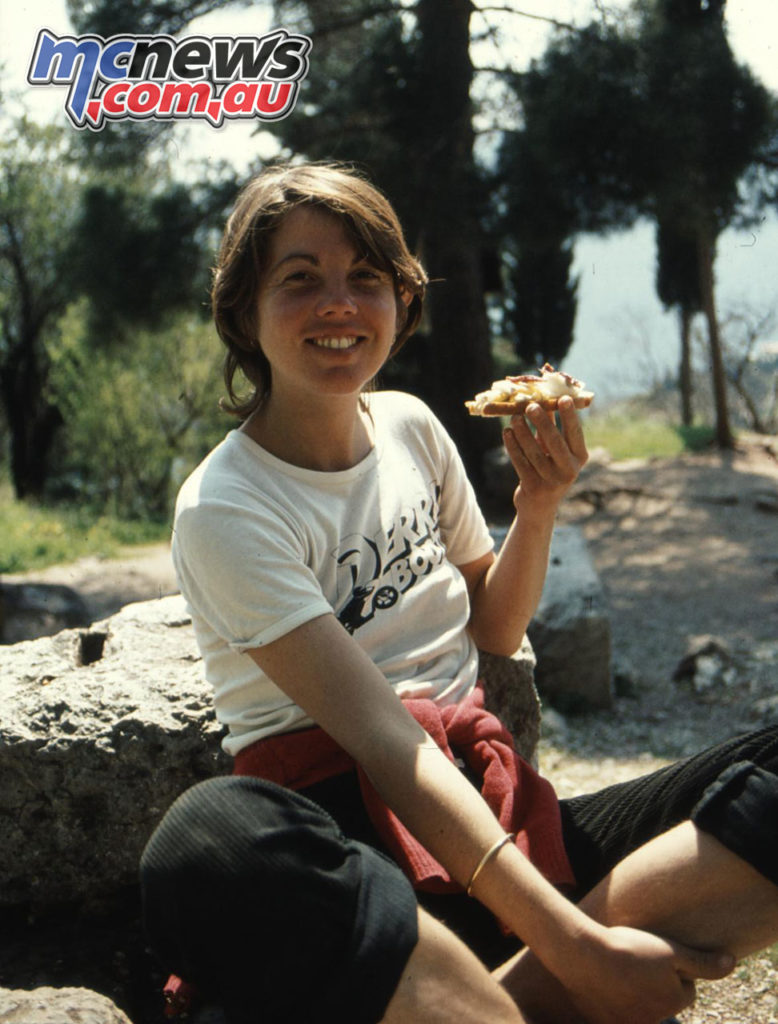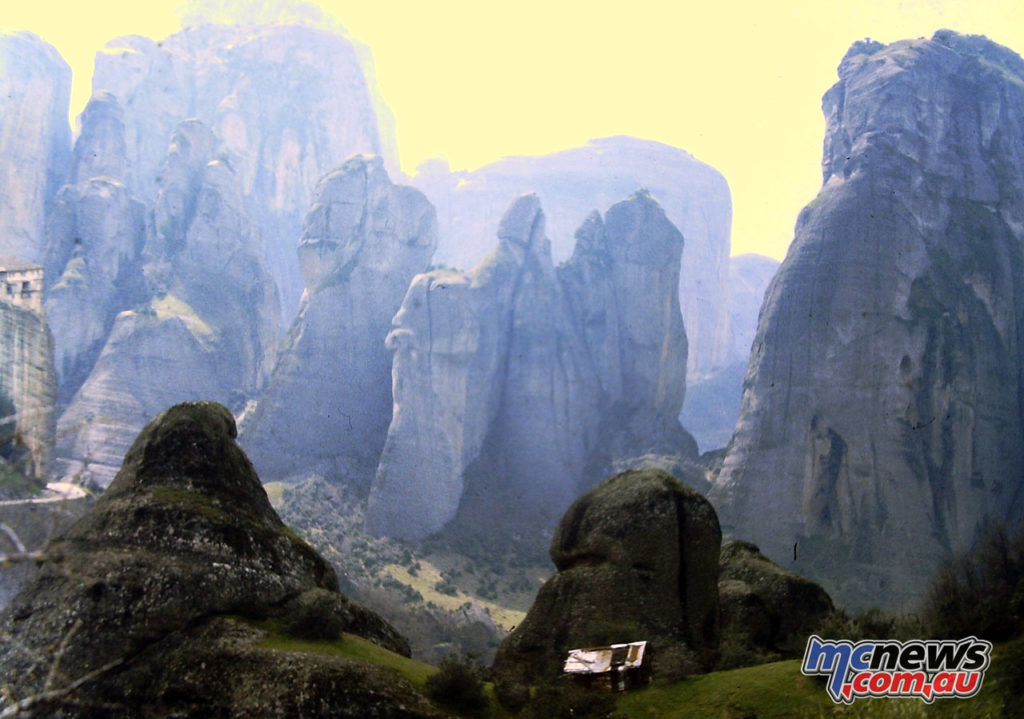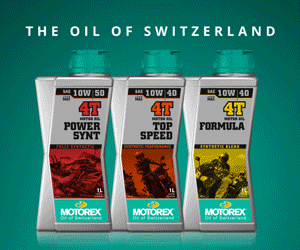Motorcycle Touring
The King of Every Kingdom
Around the world on a very small motorcycle
With J. Peter “The Bear” Thoeming
A recalcitrant bankie in Titograd and Easter in Greece – the world is a strange and wonderful place.
An absolutely horrifying detour through the mountains claimed us as soon as we left Dubrovnik. The ‘road’ was a more or less recently graded dirt track, and over the 40 or so kilometres it lasted we counted three trucks that had simply fallen off the roadway; two of them were lying on their sides, and one had rolled over onto its roof.
The bike dealt with the surface quite well, due no doubt largely to the fat rear tyre, but there was chaos at the other end as cars and trucks squeezed past each other on the narrow cliff path. We were more than glad to be on the bike.
Just before Titograd we fell foul of a radar trap. For once, I actually had not been speeding, but you can’t argue with Yugoslav traffic cops, even though their equipment was more than a little questionable.
“Our radar says you were speeding.”
‘That isn’t a radar. It’s a hairdryer.’ It was, too.
“It does not matter what it is,” he snarled and wiggled his submachine gun suggestively. I paid the fine and rode on, seething. Still, if they caught me every time I do exceed the speed limit…
The Titograd campground had been vandalised badly since Charlie and I had stayed there 18 months before. The pretty lady wasn’t in reception, either – in fact, there wasn’t anybody in reception at all. I finally found someone at the hotel that adjoins the site and they told me to camp anywhere I liked, the site was open and free.

Annie thought they just couldn’t be bothered filling in all the forms. The watchman came past, cadged a couple of drinks, and promised to look after our tent extra carefully. I went to the bank to cash a travellers’ cheque and had to scribble my name on it four times before the teller was satisfied that my signature matched the sample.
Then on into darkest Yugoslavia, up hill and down dale on steadily worsening roads. We took the main road, not the track that Charlie and I had taken, but at times it wasn’t much better. Winter had destroyed more than one bridge and undermined the road so often it was like a trials stage. In one tunnel there were great ice pillars, formed by water dripping from the ceiling, but we made it through to Skopje and then over quite passable back roads to Ohrid.
We heard a sad story that night in the cevapcici bar where we were having dinner. A young Yugoslav soldier came over to us and introduced himself in fluent Australian. He had been taken to Australia by his parents when he was two years old and had lived in Canberra for 16 years. Then he’d come back to see his relations and the army had grabbed him for two years’ national service.
They were pleased to get him since he had just passed his apprenticeship as a diesel mechanic, and they didn’t have many of those. He had eight months to go, and was counting the days. “When I got here I didn’t even speak the language,” he told us sadly.
Our landlady gave us a heroic breakfast, including a gallon of coffee. Annie had washed a pair of her knickers and hung them on the back of the bike to dry, something we often did with wet clothes, and the landlady nearly cracked up. She thought it was the funniest thing she’d ever seen, and called out all the neighbours to share her glee.
The people at Bitola were helpful and pointed out the road to Greece, which was just as well as there wasn’t a single road sign in the whole town.
Greece
There were money-changing problems at the border (never change more money than you need) and the obstinate Greek Customs man wrote the bike into my passport, which was near to being full, instead of Annie’s, which had more space. But you couldn’t really stay annoyed long. Spring was with us at last – it had been following us all the way from Sicily, and now it was finally catching up.
 After a run through fresh greenery we made camp at Meteora, below the famous rock cliffs like stone trolls with monasteries for hats and long trails of poo from the toilets overhanging the cliffs. We watched the tourist buses rolling up, and it struck me as odd that the monks should be able to reconcile the religious life with showing tourists around all day. Do they pray for a good tourist crop in between counting the admission money, I wonder?
After a run through fresh greenery we made camp at Meteora, below the famous rock cliffs like stone trolls with monasteries for hats and long trails of poo from the toilets overhanging the cliffs. We watched the tourist buses rolling up, and it struck me as odd that the monks should be able to reconcile the religious life with showing tourists around all day. Do they pray for a good tourist crop in between counting the admission money, I wonder?

There was a large chrome and glass establishment in Kalabaka which advertised itself, in large day-glo letters and in English, as a ‘typical Greek taverna’. What would Anthony Quinn have said?
Annie was befriended by a little black dog we nicknamed The Sheik for his habit of creeping into our tent when we were asleep. He followed her devotedly everywhere she went. The proprietor of the site didn’t know who owned him. ‘He just likes tourists,’ he told us.
The Plain of Thessaly, although it sounds good, was dull. The excitement set in on the mountain road after Lamia, where a new road was being built and the old one had been sort of lost underneath, making it pretty rugged. At one point we stopped and were passed by a wartime German Zündapp outfit, pressed into service to deliver vegetables and elderly Greek ladies.
After passing the great olive grove of Itea, we climbed the cliff to Delphi and camped right on the edge of the drop. The scramble around the ruins was well worth it, but it’s best timed for when the tourists are at lunch. Delphi is one of the prime sightseeing spots in the country and becomes badly crowded even in the off season.
We chatted to an elderly, tubby cop who was quite obviously in the grip of a lengthy love affair with his Harley-Davidson. He showed us where he’d painted this antediluvian monster himself, careful dabs of the brush over rust patches. A German arrived in the campsite one night on a shiny new BMW R45, still in shock from travelling on the Lamia road.
We told him to try the Skopje-Titograd highway if he wanted a real experience. He was cheerfully horrified when he saw us loading the bike with all our worldly goods, and asked politely if he might take pictures. No doubt he’s still scaring fellow motorcyclists with them, back in Germany.
The road to Thebes was fine, except that the surface deteriorated badly whenever we went through a town. Often town streets were dirt, not even gravel. Perhaps the powers that be feel that it’s a waste of time tarring them – they’d only wear out again anyway…
On the motorway the radar caught us once more. This time I wasn’t going to put up with any nonsense, and anyway I’m not scared of Greeks the way I am of Yugoslavs with submachine guns. I pointed out, at the top of my voice, that I had not been speeding as they appeared to claim, but only doing 100 on what was after all a freeway and didn’t they have anything better to do?
We were both still angry after the hairdryer episode and Annie joined in with my tirade. They eventually shooed us away, dazed by our combined assault. Around the next corner we found a sign indicating that the speed limit was 80…
Athens was, as always, dusty and noisy, with cancerous traffic. We picked up some mail, including a pair of visors kindly sent by Bob Heath and a note from the Mols saying that they’d be joining us a week later. That night, we were overcharged for our dinner of calamari down in Piraeus, and the waiter plied us with free retsina when we complained – we felt that we were getting this travelling business sorted out pretty damn well.
The week until Michel and Cathy arrived was spent exploring the Peloponnese. A couple of days lying in the sun at Epidaurus with an excursion to the well-preserved amphitheatre were followed by a visit to Sparta. Then we headed over the ranges to Kalamata and ran into more snow. It really is true; you become much more sensitive to nature’s little quirks on a bike…
On Easter Sunday, the proprietor of the ‘Melbourne’ cafe in Hora bought us some cakes and coffee. People kept giving us Easter presents all day — boiled eggs dyed red, biscuits and even a cucumber were thrust into our hands by people standing beside the road. Everyone was out in their front yards, roasting lambs on spits; the countryside smelt like a vast Greek restaurant. Olympia, which we’d intended to make the high spot of our day, had been closed by a strike. Back to reality!
On the tollway back to Athens, the toll collectors in their little hut waved us through for free, but it wasn’t a good Easter for everyone. As we crested a hill, a puppy wandered out onto the roadway. I made a crash stop and Annie scooped it up, but its owners weren’t to be seen. It had obviously been abandoned.
We stood by the side of the road for a while holding it up as we’d seen people in Morocco do who wanted to sell pups, but nobody stopped. A puppy isn’t a terribly sensible companion on a bike trip, especially when you have to cross borders. We really didn’t know what to do.
Finally, we took it along until we reached the outskirts of Athens, found a prosperous-looking suburb and dumped it on someone’s front lawn. We assumed that its chances would be better there than on the motorway. But as we drew away, it was already tottering back out onto the road. A sad end to Easter, both for the pup (I presume) and us.
Feeling down? Don’t worry, just wait until the Mols get here. Read about their arrival next time.























